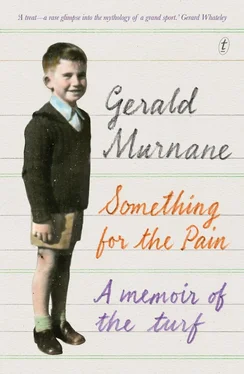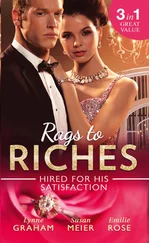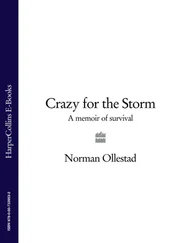One matter that told against P. S. Grimwade was the naming of his horses. Sanvo was by Sans Tache from Voucher. Paratone and Britain’s Pride, to be mentioned shortly, were, respectively, by Paramount from Folkestone and by Great Britain from a mare whose name I’ve forgotten. I used to regret that the man I so admired seemed bound by the foolish custom of combining in his horses’ names details from their parents’ names. Perhaps I should have been more accepting and supposed that my admired owner was only acting in character. He had already given away through his expressive colours as much as he cared to give away of himself. Let him hide what was left behind the sort of racehorse names that many a lesser person might have devised. Paratone won a stayer’s race at Caulfield one day at odds of twenty-to-one. Britain’s Pride was a little before my time, so to speak. When I was in my last year at school, or it may have been a year earlier, the horse won a race at Flemington at fifty-to-one.
I can cite no other long-priced winners that carried the green and white and blue. I can report, however, that Sanvo got his name into the record books as the winner of the Moonee Valley Cup in 1959. He was the best of the Grimwade horses that I saw in action — too good, it seemed, to be restrained for month after month in preparation for a long-priced betting tilt. I seem to remember that Sanvo, during 1959, was placed in several races of good quality. He may even have won such a race in his lead-up to the Moonee Valley Cup. His ability was by now exposed, and he was never again at long odds. I was present when he won the Moonee Valley Cup, and I had only a small bet on him for sentimental reasons. He was one of the favourites.
I have no more facts to report about P. S. Grimwade or his horses. Given that the Grimwade colours were no longer seen on racecourses after the early 1960s, I wonder whether he may have been already an old man when I first became aware of his existence. If this is so, I very much regret that I’ll never know how his horses performed when I was too young to be a follower of racing. Perhaps, on some afternoon in the years when I was only beginning to make sense of the sounds that so occupied my father when he sat by the wireless set of a Saturday, a horse owned by P. S. Grimwade achieved at Mentone or Williamstown what Sanvo came close to achieving at Caulfield on Show Day in 1959. I’ll never know.
If I was at Moonee Valley when Sanvo won the Cup there in 1959, why did I not watch the trophy presentation and, perhaps, see in the flesh at last my legendary owner? I suspect I wanted to keep in mind the ideal man rather than have in sight the actual man. Or, perhaps I felt sure that P. S. Grimwade would have disdained to attend even such a meeting as included the Moonee Valley Cup and Cox Plate. Perhaps I wanted to think of him as someone for whom racing was better imagined than experienced — someone such as myself. Perhaps I assumed he was just then getting up from his cane chair on the return veranda of his sprawling homestead in the Central Highlands of Victoria. He had heard the radio broadcast of the Moonee Valley Cup, and now he had turned off the radio and was about to mount his hack and to ride out to inspect some of his cattle.
Why the Central Highlands? If I had not obtained evidence to the contrary, I would have envisaged P. S. Grimwade as owning an extensive property in what I consider the centre of the universe, in the quadrilateral bounded by Ballarat, Ararat, Hamilton, and Camperdown in the Western District of Victoria, which is a landscape of plains and low hills and vast skies. I’ve never felt comfortable when surrounded by steep hills, and I’ve tried always to keep away from mountains. But the scant evidence available tells me that P. S. Grimwade owned a cattle property somewhere between Broadford and Pyalong, about seventy or eighty kilometres north of Melbourne, in a district that I’ve never visited. I have a memory of having read once, in the Weekly Times , of a clearing sale or some sort of notable event on the property of Mr P. S. Grimwade at High Camp, which, according to my maps, is a district to the north of the Northern Highway not far short of Pyalong. I recall also that the last horse owned by Mr Grimwade before his name and his colours were lost to racing was called Glenaroua. The horse failed to win a race, but its name directs me to another district on my maps, a place about seven kilometres north-east of High Camp and far from any main roads.
I’ve travelled very little during my long life, but I’ve always enjoyed poring over maps. The district between High Camp and Glenaroua seems to be close to the watershed of the Central Highlands, which are a continuation of the Great Dividing Range as it peters out in Victoria. My maps show several creeks as having their origins between High Camp and Glenaroua, and a mountain of about five hundred metres in height is shown not far north-west of Glenaroua. I reckon I’m entitled to imagine my racing saint as having inherited old money but without any wish to display it; as having turned his back on Toorak and spent much of his life in a sort of lookout tower or eyrie, from which Melbourne and its surrounding plains are the merest blur of haze to the south; as having devised there his subtly eloquent racing colours; as having planned there his infrequent plunges on long-priced horses; and as having thus provided a man he had never heard of with abundant inspiration.
In the unlikely event that this book should be read by some or another descendant of a man named P. S. Grimwade, and that the descendant should wish to tell me that my account of the man is untrue, inaccurate, preposterous, whatever, I urge that descendant not to waste energy, time, or ink on the matter. Nothing will keep me from revering my saint as he was revealed to me.
I GREW UP knowing hardly anything about alcohol. I connected it only with violence. In Bendigo, where I lived for four years of my childhood, our next-door neighbour used to come home drunk on beer of a Friday or a Saturday evening and used to beat up or threaten his wife and children. If I had to walk past one of the many hotels in Bendigo, I was frightened by what seemed to me an angry roar, although it was probably no more than the sound of twenty half-drunk blokes all talking at once. My father, his brothers, and their father were not fanatical teetotallers but drank hardly more than a bottle of beer or a glass of whisky at Christmas, although I’ve since heard that William Murnane, my great-grandfather, was a problem drinker, as we might call him nowadays. I have only the testimony of the puritanical Murnanes to rely on. Poor old William, or Bill, or whatever they called him, was a dairy farmer in a remote district, many miles from the nearest hotel. Why did he earn a reputation as a boozer? Did he drink a few glasses too many in a Warrnambool hotel during the weekly trip thither by horse and cart? Did he bring home a flask of grog and sip from it sometimes after tea?
I reckon I’ve drunk more in the last week than my poor ancestor drank in three or four months, but my aunts, his granddaughters, shook their heads at the mention of his name, whereas my grandchildren have never seen me with a glass in my hand. (I have a glass of home-brewed beer beside me now, but my grandchildren are four hundred kilometres away!) If I had to point to a strand of boozers in my ancestry, I’d aim my finger at the Mansbridges. My father’s mother was a Mansbridge and, although she would never have let a drop pass her lips, her brothers and her nephews were a thirsty lot.
During the many years when my father bet regularly with illegal SP bookmakers, he would have spent countless hours in hotels. Not all of this time would have been spent in bars. At the hotel in Sydney Road, Coburg, that was his favourite haunt, betting took place in a back laneway well away from the beer taps. But in Bendigo, during some of his boldest years as a punter, my father spent entire Saturday afternoons in hotel bars, surrounded by beer drinkers, while he drank only the occasional lemon squash. Only once did he come home affected by alcohol, although I didn’t recognise his condition at the time. I was puzzled when he asked my brother and me three times in about fifteen minutes whether we had fed the chooks and collected the eggs. I was puzzled by his grinning at us while we ate our tea and his telling us several times what a fine family he had. I was even more puzzled by the strange sounds that I heard soon after I had gone to bed. My mother told me many years later that I had heard my father vomiting into the gully trap his evening meal and all the whisky that he had drunk during the afternoon while he was betting on the Melbourne races in one of the hotels of Bendigo. Why did he behave so much out of character on that one afternoon? And why did he make a mess of himself with whisky when he might have drunk beer or shandies? I still wonder sometimes about these matters.
Читать дальше












